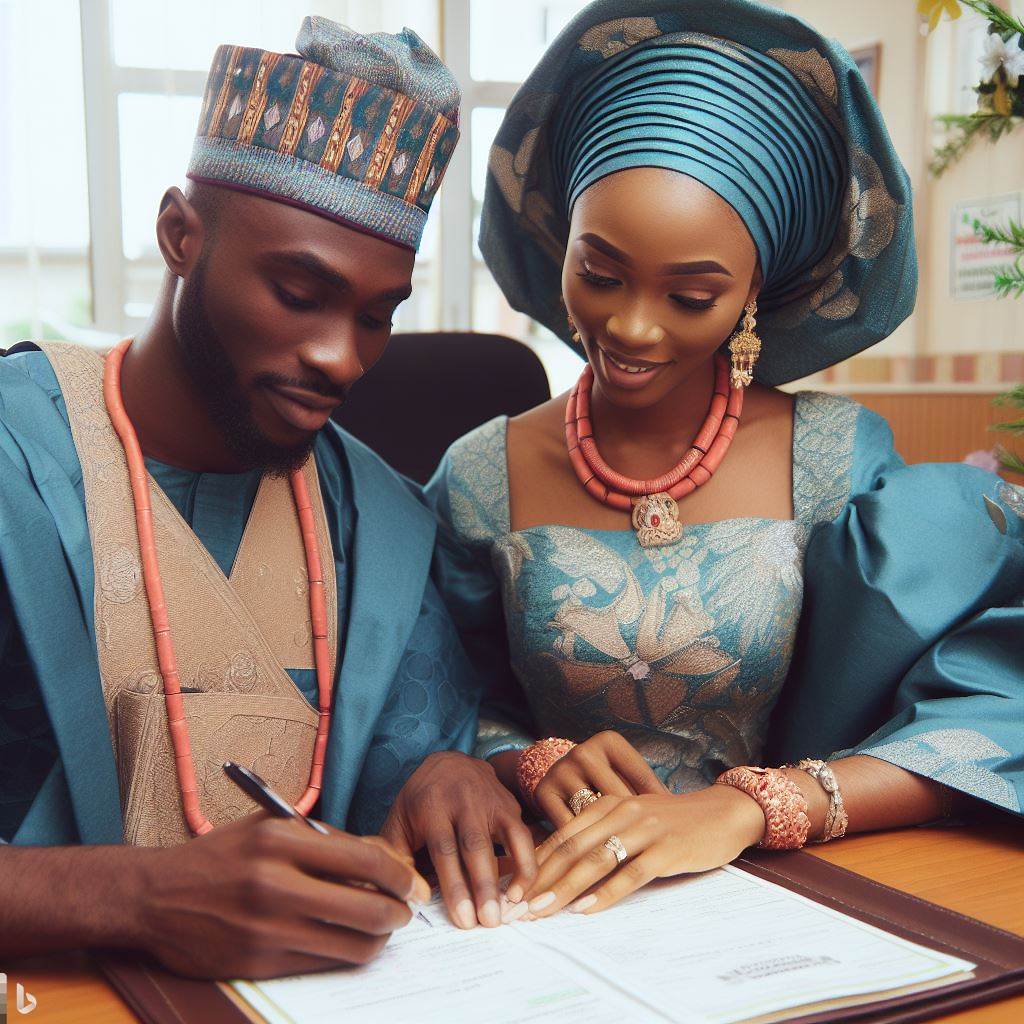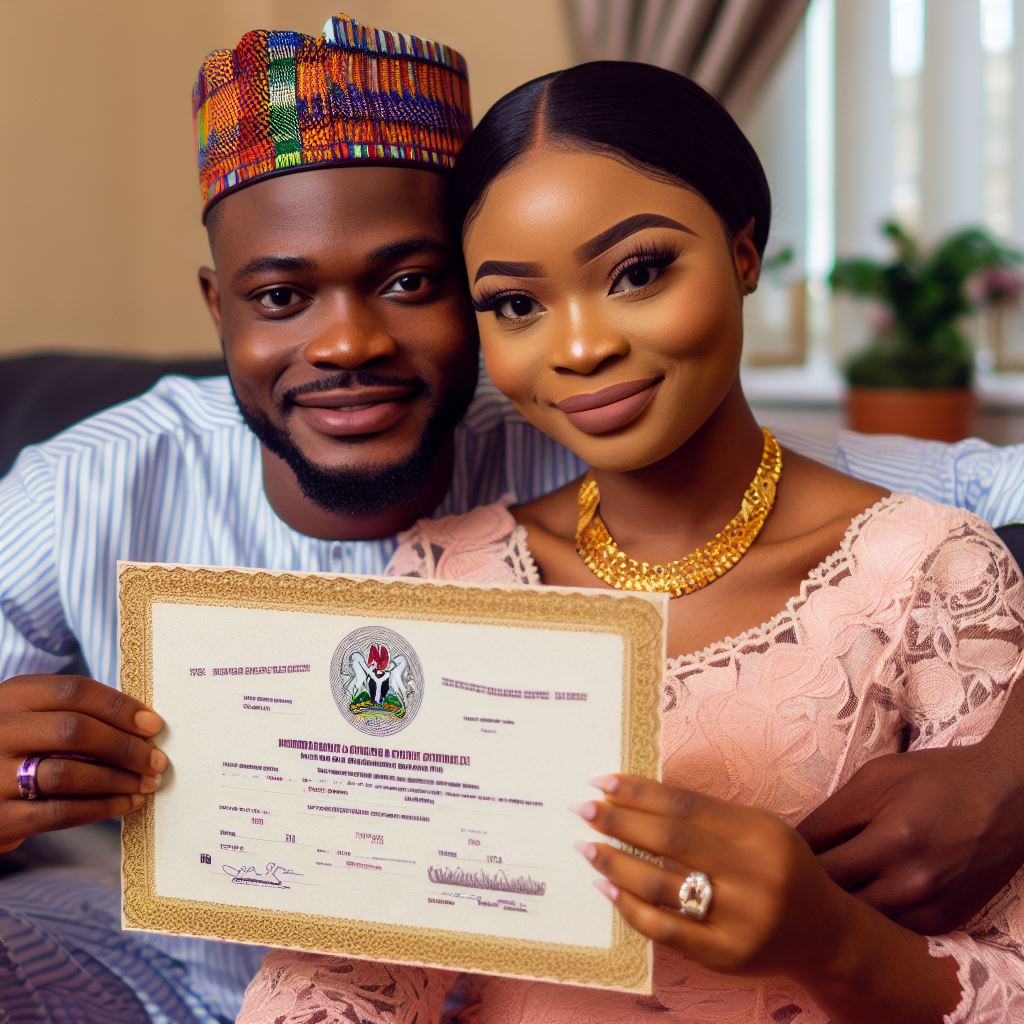Introduction
Marriage contracts play a crucial role in Nigeria as they provide legal protection and security for couples.
These contracts are complex and require careful consideration of legal aspects, such as property rights and inheritance.
One important consideration is the Customary Marriage Act, which governs marriage contracts in Nigeria.
Under this Act, a marriage must be registered to be legally recognized and enforceable.
Additionally, couples should consider prenuptial agreements to specify the division of property and assets.
Another legal consideration is the Matrimonial Causes Act, which governs divorce proceedings and settlements.
When drafting a marriage contract, it is essential to consult with a qualified lawyer to ensure it complies with Nigerian laws.
Legal professionals can analyze the complexities and provide guidance on the inclusion of specific clauses.
Proper legal assistance can prevent future disputes and protect the rights of both parties in the marriage.
In essence, marriage contracts in Nigeria are important legal documents that require careful consideration of various complexities.
Obtaining legal guidance throughout the process can ensure a fair and legally binding marriage contract.
Couples should prioritize the creation of a comprehensive and enforceable contract to safeguard their rights and interests.
Understanding Marriage Contracts in Nigeria
Definition and Purpose of Marriage Contracts
Marriage contracts in Nigeria are legally binding agreements entered into by couples who intend to get married.
These contracts govern various aspects of the marriage, including property rights, financial obligations, and the rights and responsibilities of each party.
Types of Marriage Contracts Recognized in Nigeria
Customary Marriage Contracts
Customary marriage contracts are based on traditional customs and are recognized by customary law in Nigeria.
These contracts vary across different ethnic groups and regions.
Statutory Marriage Contracts
Statutory marriage contracts are governed by the Marriage Act in Nigeria.
They are typically conducted in a marriage registry and are recognized by law nationwide.
Islamic Marriage Contracts
Islamic marriage contracts are recognized under Islamic law.
They are conducted in accordance with Sharia principles and are applicable to Muslim couples.
Legal Requirements for Entering into a Valid Marriage Contract in Nigeria
In order to enter into a valid marriage contract in Nigeria, several legal requirements must be met:
Consent
Both parties must give their free and voluntary consent to the marriage contract.
Age
The legal age for marriage in Nigeria is 18 years. However, individuals below this age can marry with parental consent.
Monogamy
Monogamy is the only recognized form of marriage in Nigeria, except for customary marriages, which allow for polygamy in certain cultures.
Registration
Statutory marriages must be registered with the appropriate marriage registry to be legally recognized.
Capacity
Both parties must be mentally and physically capable of entering into a marriage contract.
No Prohibited Relationships
The parties must not be closely related by blood or within the prohibited degrees of consanguinity or affinity.
Witnesses
Marriage contracts require the presence of at least two witnesses who are of sound mind and possess the legal capacity to witness the marriage.
It is important for couples to understand the different types of marriage contracts recognized in Nigeria and the legal requirements for a valid marriage.
By doing so, they can protect their rights and property, as well as ensure that their marriage is legally recognized.
Read: Celebrating Anniversaries: Keeping Love Alive in Nigeria
Key Elements of Marriage Contracts in Nigeria
1. Identification of the parties involved (bride, groom, witnesses)
When drafting a marriage contract in Nigeria, it is essential to clearly identify the parties involved.
This includes the bride, groom, and any witnesses who are present during the ceremony.
2. Agreement on mutual rights and obligations of the spouses
Another crucial element of a marriage contract is the agreement on the mutual rights and obligations of the spouses.
This ensures that both parties have a clear understanding of their responsibilities within the marriage.
3. Determination of financial arrangements (dowry, bride price, maintenance)
Financial arrangements are a key aspect of marriage contracts in Nigeria.
This includes determining the dowry or bride price, as well as any maintenance or financial support that may be required during the marriage.
4. Property rights and inheritance matters
Marriage contracts in Nigeria also address property rights and inheritance matters.
This includes determining how property will be owned and managed during the marriage, as well as any provisions for inheritance in case of death.
5. Consideration of child custody and support provisions
Child custody and support provisions are essential components of marriage contracts.
These provisions outline how custody of any children will be determined and how financial support for the children will be provided.
6. Incorporation of dispute resolution mechanisms
Finally, it is important to include dispute resolution mechanisms in marriage contracts.
This enables addressing any disagreements or conflicts that may arise during the marriage fairly and equitably.
Overall, marriage contracts in Nigeria contain several key elements that help facilitate a successful and mutually beneficial marriage.
From identifying the parties involved to addressing financial arrangements, property rights, and child custody, these contracts provide a solid framework for a strong marital relationship.
Couples can also guarantee that they resolve any disputes or conflicts fairly and peacefully by incorporating dispute resolution mechanisms.
Read: Marriage Therapy & Counselling Options in Nigeria
Hiring Legal Assistance for Marriage Contracts
Importance of seeking legal help to ensure a legally binding and enforceable contract
- Legal assistance is crucial to guarantee that your marriage contract adheres to Nigerian laws.
- A lawyer will ensure the contract is legally binding and enforceable in case of disputes.
- Without legal help, your contract may be invalid or lack important provisions.
Tips for choosing a competent and experienced lawyer
- Research and select a lawyer who specializes in family law and has experience with marriage contracts.
- Check their reputation, online reviews, and ask for references from previous clients.
- Ensure the lawyer is licensed to practice law in Nigeria and has a good track record.
Role of the lawyer in drafting, reviewing, and negotiating the marriage contract
- The lawyer will draft the marriage contract, ensuring all legal requirements are met.
- They will review the contract to identify any potential issues or gaps in the provisions.
- The lawyer will negotiate with the other party’s lawyer to establish mutually agreeable terms.
- They will advise you on your rights, obligations, and potential consequences of the contract.
Costs associated with legal assistance for marriage contracts
- The costs of legal assistance vary based on the complexity of the contract and the expertise of the lawyer.
- Most lawyers charge an hourly rate or a flat fee for their services.
- It’s essential to discuss the fees upfront and ensure they are within your budget.
- Consider the costs as an investment to safeguard your interests and avoid future legal complications.
In short, seeking legal assistance for your marriage contract in Nigeria is of utmost importance.
A competent and experienced lawyer will ensure that your contract is legally binding, enforceable, and protects your rights and interests.
Taking the time to research and choose the right lawyer, understanding their role in drafting and reviewing the contract, and being aware of the associated costs will contribute to a successful and legally sound marriage contract.
Remember, legal help is an investment in the stability and happiness of your marriage.
Read: Communication: The Pillar of Nigerian Marriage Success

Challenges and Pitfalls to Avoid
Common pitfalls and mistakes in marriage contract negotiations
- Failing to clearly articulate the expectations and responsibilities of each spouse.
- Not seeking legal advice to ensure the contract reflects individual needs and protects both parties.
- Rushing through the negotiation process without proper consideration of long-term implications.
- Ignoring financial aspects, such as assets, debts, and property, which can lead to future conflicts.
- Overlooking the importance of including dispute resolution mechanisms in the contract.
Potential issues with incomplete or poorly drafted contracts
- Ambiguity in contract terms can lead to disagreements and disputes.
- Lack of clarity regarding spousal support, property division, and custody arrangements can create ongoing conflicts.
- Failure to address future contingencies, such as divorce or death, may result in unfair outcomes.
- Inadequate provisions for the rights and obligations of both parties can be detrimental.
- Absence of specific clauses to protect against unforeseen circumstances may leave parties vulnerable.
Cultural and religious considerations that may affect marriage contracts
- In Nigeria, cultural norms and religious beliefs heavily influence marriage contracts.
- Certain religious and customary laws recognize polygamy, and this recognition influences contract negotiations.
- Customary practices surrounding dowry, bride price, and inheritance may be essential considerations.
- Religious requirements, such as prenuptial agreements or mandatory counseling, should be accounted for.
- Balancing cultural traditions with legal obligations can be challenging but crucial for a successful contract.
Importance of updating and revisiting the contract as circumstances change
- Life events like the birth of children, career changes, or relocation can warrant contract amendments.
- Regularly reviewing the contract ensures it remains relevant and adapts to evolving needs.
- Updating the contract aids in maintaining clarity and mutual understanding between spouses.
- Circumstances may change financial capabilities, necessitating modification of spousal support or division of assets.
- Revisiting the contract fosters open communication and reinforces the stability of the marriage.
It is vital to navigate the challenges and pitfalls associated with marriage contracts in Nigeria.
By avoiding common mistakes, addressing potential issues, understanding cultural and religious considerations, and regularly updating the contract, couples can safeguard their interests and promote a healthy and harmonious marital relationship.
Read: Setting and Achieving Goals as a Married Couple in Nigeria
Conclusion
Navigating marriage contracts in Nigeria requires careful consideration and legal guidance.
It is crucial to recap the key points discussed in this blog section.
Seeking legal help is of utmost significance to ensure a smooth and lawful marriage contract.
This guarantees protection for both parties and safeguards their rights.
Legally sound agreements can help preserve the sanctity of marriage.
By having a legally binding contract, couples can avoid potential disputes and conflicts in the future.
Therefore, it is essential for individuals entering into marriage contracts in Nigeria to prioritize seeking legal advice and assistance.
This will not only provide legal protection but also uphold the integrity and harmony of the marital relationship.




